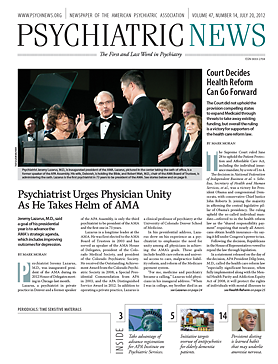Resilience lies at the heart of current thinking about stress, yet even defining the term is not easy.
“Resilience can be relative resistance to environmentally risky experiences, or overcoming stress and adversity, or just having a relatively good outcome afterward,” said child psychiatrist Sir Michael Rutter, M.D., at APA’s annual meeting in Philadelphia in May.
That multi-optioned definition may reflect the great individual differences observed in response to all kinds of environmental hazards, said Rutter, a professor of developmental psychopathology at the Institute of Psychiatry, King’s College London.
“Resilience is not a single, temperamental trait,” he said. “It is a process which involves a response to stress. People may be resilient to some outcomes or in some contexts or at some times of their lives, but not others.”
Genes play a role, but rarely in a direct way, he noted.
Individual differences in response to adversity may reflect biological pathways influenced by genes but also include an environmental risk factor and an environmental mediator, along with evidence of substantial genetic risk.
For instance, studies of 5-HTT alleles by Avshalom Caspi and colleagues found no significant main effect for the genes. However, the s/s allele, when combined with childhood abuse, produced a higher risk of major depression.
There were behavioral examples, as well.
Adoption is generally a neutral influence, but becomes protective only if a child has suffered neglect or abuse. Good quality, nonmaternal day care benefited children from disadvantaged families but had no effect on other children, Rutter explained.
Another hypothesis, still under study, suggests that the same genes that make things worse for people can also make things better, said Rutter. “Genes may not confer vulnerability for adversity but may influence responsivity to all environments, good or bad.”
Brief exposure to risk may “inoculate” a person to stressors, analogously to the acquisition of biological immunity to pathogens. “We can’t avoid stress, and it may be valuable,” he said. “Children who lived through the Depression in the 1930s learned to cope with adversity.”
But can people learn to be resilient?
Rutter’s research has indicated that planning, self-reflection, thinking about one’s experiences, a sense of agency, taking responsibility, and a commitment to social relations were protective for young people.
Those can be fostered by activities— such as academics, sports, or the arts— outside the family that foster a sense of accomplishment, he suggested.
Late recovery from early adversities may also stem from “turning-point” experiences that “knife off the past” and provide new opportunities.
For example, studies in Great Britain showed that marriage was protective against engaging in criminal activity.
The mechanism of action involves more than love, he said. “The wife may offer a source of external discipline, and marriage brings a young man into a new kin group and a new peer group with different values.”
Other research indicated that military service can similarly serve to separate a young man from his troubled past, showing, for instance, that enlistment postponed life decisions by a disadvantaged 18-year-old for several years, created a broader range of career options, and allowed the prefrontal cortex to develop, as well. Military benefits that include further education or training also might contribute to Rutter’s ideals of planning, self-reflection, and personal agency as building blocks of resilience.
In any case, he concluded, “They must not focus on what happened in their past, but must look for a positive way forward.”

